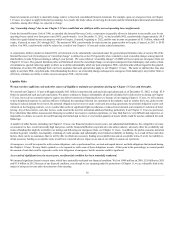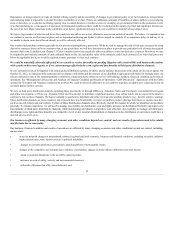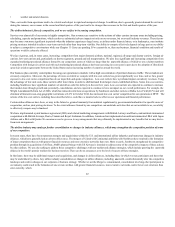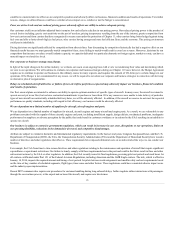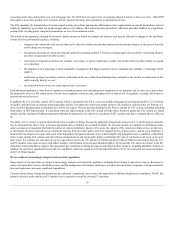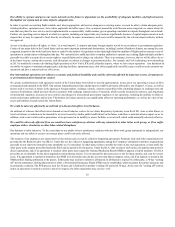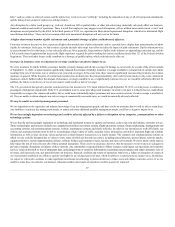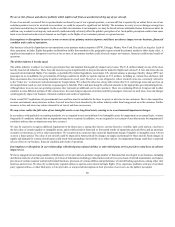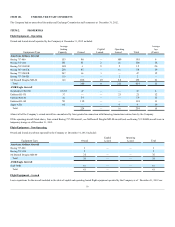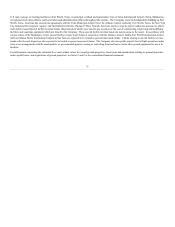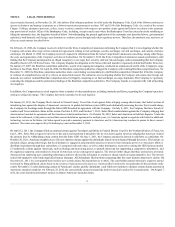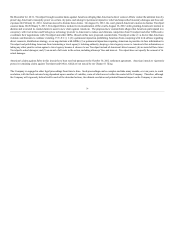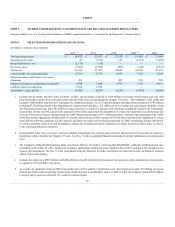American Airlines 2012 Annual Report Download - page 28
Download and view the complete annual report
Please find page 28 of the 2012 American Airlines annual report below. You can navigate through the pages in the report by either clicking on the pages listed below, or by using the keyword search tool below to find specific information within the annual report.
We are at risk of losses and adverse publicity which might result from an accident involving any of our aircraft.
If one of our aircraft, an aircraft that is operated under our brand by one of our regional operators, or an aircraft that is operated by an airline that is one of our
codeshare partners were to be involved in an accident, we could be exposed to significant tort liability. The insurance we carry to cover damages arising from
any future accident may be inadequate. In the event that our insurance is not adequate, we may be forced to bear substantial losses from an accident. In
addition, any accident involving any such aircraft could materially adversely affect the public's perception of us. Such public perception could in turn cause
harm to our brand and reduce travel demand on our flights, or the flights of our codeshare partners or regional carriers.
Interruptions or disruptions in service at one or more of our primary market airports could have an adverse impact on our business, financial
condition and results of operations.
Our business is heavily dependent on our operations at our primary market airports in DFW, Chicago, Miami, New York City and Los Angeles. Each of
these operations includes flights that gather and distribute traffic from markets in the geographic region around the primary market to other major cities. A
significant interruption or disruption in service at one or more of our primary markets could adversely impact our business, financial condition and results of
operations.
The airline industry is heavily taxed.
The airline industry is subject to extensive government fees and taxation that negatively impact our revenue. The U.S. airline industry is one of the most
heavily taxed of all industries. These fees and taxes have grown significantly in the past decade for domestic flights and various U.S. fees and taxes also are
assessed on international flights. For example, as permitted by federal legislation, most major U.S. airports impose a passenger facility charge (PFC) per
passenger on us. In addition, the governments of foreign countries in which we operate impose on U.S. airlines, including us, various fees and taxes, and
these assessments have been increasing in number and amount in recent years. Moreover, we are obligated to collect a federal excise tax, commonly referred to
as the “ticket tax,” on domestic and international air transportation. We collect the ticket tax, along with certain other U.S. and foreign taxes and user fees on
air transportation (such as a per-ticket tax on passengers to fund the TSA), and pass along the collected amounts to the appropriate governmental agencies.
Although these taxes are not our operating expenses, they represent an additional cost to our customers. There are continuing efforts in Congress and in other
countries to raise different portions of the various taxes, fees and charges imposed on airlines and their passengers. Increases in such taxes, fees and charges
could negatively impact our business, financial condition and results of operations.
Under recent DOT regulations, all governmental taxes and fees must be included in the fares we quote or advertise to our customers. Due to the competitive
revenue environment, many increases in these fees and taxes have been absorbed by the airline industry rather than being passed on to the customer. Further
increases in fees and taxes may reduce demand for air travel, and thus our revenues.
We may never realize the full value of our intangible assets or our long-lived assets, causing us to record material impairment charges.
In accordance with applicable accounting standards, we are required to test our indefinite-lived intangible assets for impairment on an annual basis, or more
frequently if conditions indicate that an impairment may have occurred. In addition, we are required to test certain of our other assets for impairment if
conditions indicate that an impairment may have occurred.
We may be required to recognize additional impairments in the future due to, among other factors, extreme fuel price volatility, tight credit markets, a decline in
the fair value of certain tangible or intangible assets, unfavorable trends in historical or forecasted results of operations and cash flows and an uncertain
economic environment, as well as other uncertainties. We can provide no assurance that a material impairment charge of tangible or intangible assets will not
occur in a future period. The value of our aircraft could be impacted in future periods by changes in supply and demand for these aircraft. Such changes in
supply and demand for certain aircraft types could result from grounding of aircraft by us or other carriers. An impairment charge could have a material
adverse effect on our business, financial condition and results of operations.
Interruptions or disruptions in our relationships with third-party regional airlines or other third-party service providers could have an adverse
impact on us.
We have engaged an increasing number of third-party service providers to perform a large number of functions that are integral to our business, including
distribution and sale of airline seat inventory, provision of information technology infrastructure and services, provision of aircraft maintenance and repairs,
provision of certain customer and aircraft related functions, provision of various utilities and performance of aircraft fueling operations, among other vital
functions and services. We also rely on third-party regional airlines to operate some American Eagle flights. If we experience problems with any of our third-
party regional airlines, or other third-party service providers, or unexpected interruptions in their provision of services to us, the public's perception
28


